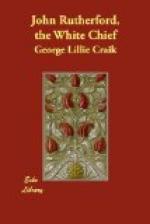He brought his wife with him in a canoe to the ship; and having known Marsden well in New South Wales, was delighted to see that gentleman, and proved of considerable use to him in his intercourse with the other New Zealanders. Although not accustomed to speak English in his new country, Jem had by no means forgotten that language. He had been on three warlike expeditions to the East Cape in the course of the past five years; but had gone, he said, only because he could not help it, and had never assisted in devouring the prisoners. Dillon met both Jem and the Hindoo, when he was at the Bay of Islands in July, 1827. The former had his son with him, a boy about twelve years of age.
These, and many other examples which might be added, exhibit the force of habit which governs the actions of all men, whether in a savage or civilized state. There are, of course, exceptions. When Cook left Omai,[CS] during his last voyage, at Huaheine, with every provision for his comfort, he earnestly begged to return to England. It was nothing that a grant of land was made to him at the interposition of his English friends, that a house was built and a garden planted for his use. He wept bitter tears; for he was naturally afraid that his new riches would make him an object of hatred to his countrymen. He was much caressed in England; and he took back many valuable possessions and some knowledge. But he was originally one of the common people; and he soon saw, although he was not sensible of it at first, that without rank he could obtain no authority. He forgot this, when he was away from the people with whom he was to end his days; but he seemed to feel that he should be insecure when his protector, Cook, had left their shores. He divided his presents with the chiefs; and the great navigator threatened them with his vengeance if Omai was molested. The reluctance of this man to return to his original conditions was principally derived from these considerations, which were to him of a strictly personal nature. The picture which a popular poet has drawn of the feelings of Omai is very beautiful, and in great part true as applied to him as an individual; but it is not true of the mass of savages.
The habits amidst which they were born may be modified by an intercourse with civilized men, but they cannot be eradicated. The following is the poetical passage to which we alluded. Omai had, altogether, a more distinguished destiny than any other savage—he was cherished by Cook, painted by Reynolds, and apostrophised by Cowper:—
“The dream is past, and thou hast
found again
Thy cocoas and bananas, palms and yams,
And homestall thatch’d with leaves.
But hast thou found
Their former charms? And, having
seen our state,
Our palaces, our ladies, and our pomp
Of equipage, our gardens, and our sports,
And heard our music, are thy simple friends,
Thy simple fare, and all thy plain delights,




